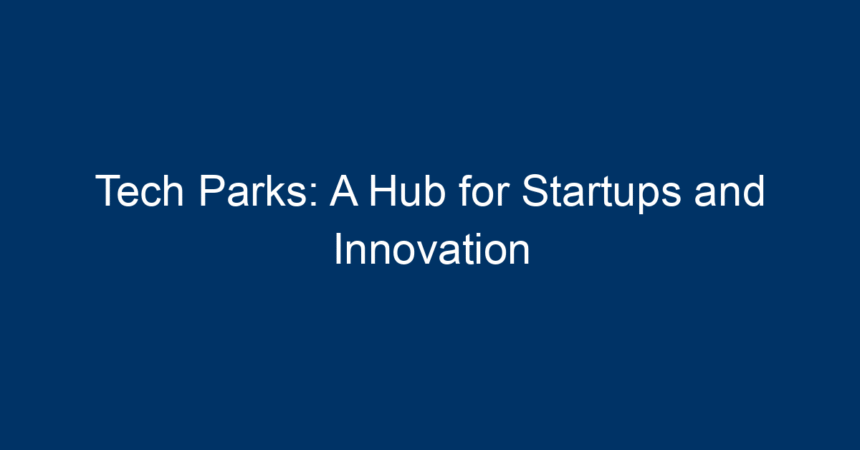In today’s fast-paced world, innovation drives economic growth and societal advancement. At the forefront of this dynamic landscape are tech parks, vibrant ecosystems where startups flourish, and groundbreaking ideas come to life. These specialized zones foster collaboration, provide essential resources, and create an environment that accelerates technology advancement. In this article, we’ll explore how tech parks serve as a springboard for innovation, the benefits they offer to startups, and what makes them essential in the tech ecosystem.
What Are Tech Parks?
Tech parks, also known as technology parks or innovation hubs, are designated areas that host a cluster of technology-centric companies, research institutions, and entrepreneurs. They are designed to promote research and development (R&D), facilitate the commercialization of new technologies, and support the growth of startups. These parks serve as a nurturing ground for innovation, offering a unique blend of resources, networking opportunities, and access to talent.
The Evolution of Tech Parks
The concept of tech parks emerged in the late 20th century as a response to the growing needs of the technology sector. Initially inspired by the success of Silicon Valley, tech parks began to appear worldwide, each tailored to its local economic needs and strengths. Today, these parks have evolved into sophisticated ecosystems, integrating various stakeholders such as universities, research centers, venture capitalists, and corporate partners.
Benefits of Tech Parks for Startups
1. Access to Resources
One of the main advantages of establishing a startup within a tech park is the unparalleled access to resources. This includes affordable office space, advanced laboratories, and state-of-the-art technology. Many tech parks provide designated facilities for prototyping, testing, and product development, ensuring startups have everything they need to bring their ideas to life.
2. Networking Opportunities
Tech parks foster a community of like-minded entrepreneurs, making them excellent places for networking. Startups can connect with potential partners, investors, and industry experts, resulting in valuable collaborations. Regular events, workshops, and seminars hosted within tech parks create an ongoing dialogue that stimulates creativity and sharing of ideas.
3. Mentorship and Support
Many tech parks offer programs designed to support early-stage startups. Mentorship from experienced entrepreneurs, access to incubators, and accelerator programs are commonplace. This guidance is essential for fledgling companies, helping them navigate the complex landscape of business development.
4. Access to Talent
Tech parks are often located near universities and research institutions, providing startups with access to a steady stream of talented graduates. This proximity allows companies to recruit skilled professionals in fields like software development, engineering, and design. Attracting the right talent is crucial for any startup’s success.
5. Funding Opportunities
Startups in tech parks frequently benefit from better access to venture capital and angel investors. Many investors actively seek opportunities within these ecosystems, looking to fund the next big breakthrough. Additionally, tech parks often have established relationships with venture capital firms, making it easier for startups to find the financial support they need.
Key Features of Successful Tech Parks
1. Collaboration Spaces
Successful tech parks design their structures to encourage collaboration. Open spaces, meeting rooms, and communal areas foster interaction among startups, researchers, and industry experts. These spaces are not just places to work; they are designed to cultivate collaboration and creativity, allowing ideas to flow freely.
2. Comprehensive Support Services
From legal advice to marketing support, tech parks often offer a range of services to help startups thrive. Access to professional services ensures that entrepreneurs can focus on their core business activities while receiving the support they need in other areas.
3. Focus on Specialization
While some tech parks cater to a wide range of industries, the most successful ones often focus on specific sectors—such as biotech, fintech, or renewable energy. This specialization allows for targeted resources and expertise, which can significantly enhance innovation within that field.
4. Strong Community Engagement
Successful tech parks actively engage with the local community and policymakers. By fostering a strong relationship with the community, tech parks can gain support for initiatives that benefit local economies and encourage community participation in technology-driven projects.
Notable Examples of Tech Parks Worldwide
1. Silicon Valley, USA
Often referred to as the birthplace of tech parks, Silicon Valley has been the incubator for some of the world’s most successful tech companies. Its unique blend of venture capital, talent, and innovation continues to draw startups from around the globe.
2. Bangalore, India
Known as the "Silicon Valley of India," Bangalore is home to numerous tech parks and innovation hubs that support a thriving startup ecosystem. The city benefits from a large pool of skilled professionals and is a major player in the tech sector.
3. Shenzhen, China
Shenzhen has rapidly ascended as a global tech hub, with tech parks driving the growth of hardware innovation. The city’s integration of manufacturing capabilities and entrepreneurial spirit makes it an attractive destination for tech startups.
4. Cambridge, UK
The Cambridge Science Park is one of the oldest and most successful tech parks in the UK. It has a strong focus on technology and life sciences and hosts a vibrant community of startups and established firms.
Challenges Faced by Startups in Tech Parks
1. Competition
While tech parks can provide a supportive environment, the level of competition can also be intense. Startups must differentiate themselves and constantly innovate to stand out in a crowded marketplace.
2. High Operational Costs
Despite many advantages, some tech parks come with high operational costs. Rent and utilities can accumulate quickly, particularly in well-established parks, making financial management critical for startups.
3. Dependency on Ecosystem
Startups in tech parks can become overly reliant on the resources and networks available within the park. While this can be beneficial in the short term, it may adversely affect long-term sustainability if they fail to establish broader networks outside the park.
The Future of Tech Parks
As technology continues to evolve, so too will the role of tech parks. The rise of remote work, increased globalization, and the need for sustainable innovation are trends that will undoubtedly reshape these hubs. Future tech parks may see a greater emphasis on environmental responsibility, diversity, and inclusion within their ecosystems.
Conclusion: Unlocking Opportunities within Tech Parks
Tech parks provide a rich tapestry of opportunities for startups willing to navigate their unique landscape. The access to resources, mentorship, networking, and funding is invaluable for any entrepreneurial endeavor. As we move into a future dominated by rapid technological change, the importance of these innovation hubs will only continue to grow.
Actionable Insights
-
Research Local Tech Parks: If you’re a startup or an entrepreneur seeking support, research local tech parks that align with your industry.
-
Engage in Networking: Attend events, workshops, and seminars within tech parks to build relationships and gather insights from fellow entrepreneurs.
-
Leverage Support Services: Take advantage of the professional services offered by tech parks, including mentorship and funding opportunities.
- Focus on Innovation: Embrace the collaborative environment tech parks foster, and remain open to new ideas and partnerships.
By understanding the dynamics of tech parks, startups can unlock their full potential and drive innovation forward, contributing to a brighter technological future.




